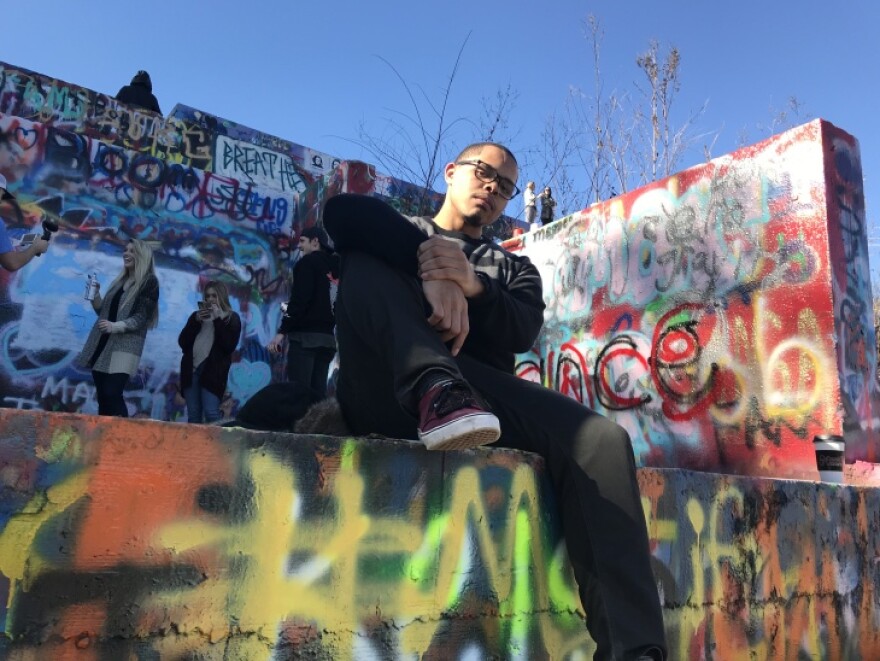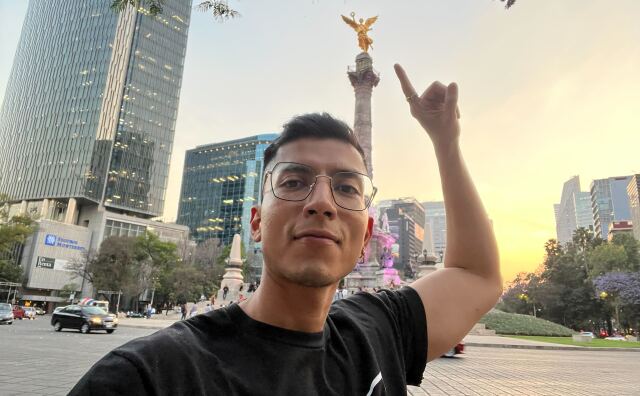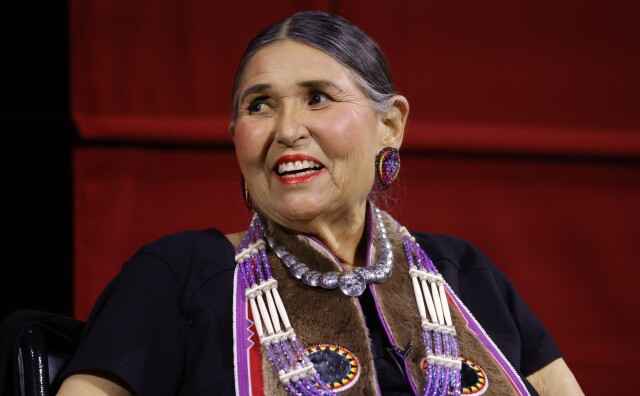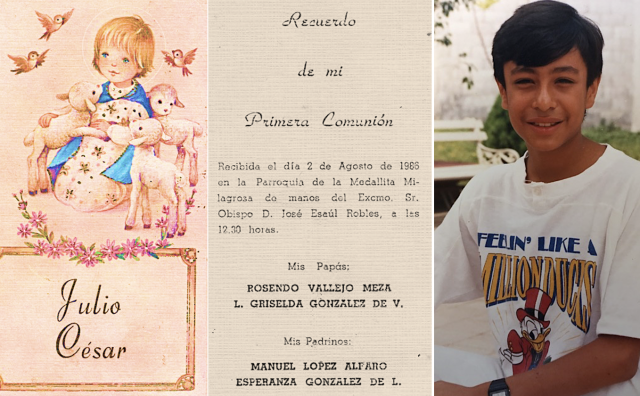Listen to the radio version of this essay:
I remember being hunched over my desk, staring at the computer screen clock with my hands clenched. When the clock turned to half past one, I joined a Zoom video conference with four other interview candidates who were vying for a position on a local public transportation board. In theory, I was a perfect fit. I exceeded the requirements, used public transportation and had a passion for service. It was in the bag.
After a quick glance on the video call, there was nothing new: I was the only black guy. It didn't matter, I thought. Well, until I learned the council was conducting a group interview with all of the candidates. Then, it was my turn.
-
From June 2020 to July 2021, we published your stories each week to continue important conversations about race/ethnicity, identity and how both affect our lived experiences. We now have a new series Being American, which is again soliciting your essays.
-
Read:
I remember talking, but it was an out-of-body experience. I wanted my words to be precise -- like anyone would during an interview, but even more immaculate than normal. I felt an automatic duty to disprove any presumptions about me based on my race and demonstrate how articulate and knowledgeable I am.
Before I knew it, I finished my piece. At the end of the call, the interviewer said they would submit the names to the board for consideration.
The next day I got an email. The interviewers recommended all of the candidates on the video call to the board except me.
MORE FROM OUR RACE IN LA SERIES
- Jogging While Black: 'And Still They Crossed The Street'
- Black And Tired In This American Newsroom
- Conflicted: A Black Journalist's Reckoning With Her Race, Family And Police Brutality
- How To Participate In Our Series
It's not so much the failure that bothered me. Being turned down for opportunities is a part of life. But I pondered why I felt the need to portray myself in such an unreal manner. Why did I feel that extra pressure to perform?
Why couldn't I just...be me?
I don't have a long story or history of extreme racism, being called out of my name, or being denied the opportunity to grow. But I know that my life -- being black -- has revolved around microaggressions and my ability to internalize them.
GROWING UP
During the summer as a kid, I would live the dream of my youth. My parents were off to work, and I didn't have school, so I got to watch TV all day long at my grandmother's house. But every so often my grandmother would call me into the kitchen as she leaned against her tile-faced countertops. I'd walk in begrudgingly, time after time, because, well, what could be so pressing to interrupt my TV show? Dirty dishes? A tattle tale? Another broken picture frame (yes, Gamma, that was probably me again).

No, it was about life being black.
Before age 10 (and well after), my grandmother told me about the police and how people -- mainly white people -- would perceive me. I vividly remember how she demonstrated what it was like to be arrested if I committed a crime -- which is something that was drilled into me before George Floyd, Michael Brown, and countless others. She would take my chubby arms and force them behind my back, telling me that the police would treat me differently because I'm black.
As a kid, I just knew I didn't want to make my grandmother upset. I promised her that I would never get in trouble like that. Some people might say my grandmother was callous, unreasonable, or even destructive. Now, as an adult, I know she did it out of love.
Those difficult lessons were only the beginning. In elementary school, I had a habit of turning in haphazard work, and my mother scorned me for it. Her eyes cut across my spirit when she told me that being a black man would mean that I would have to be more than mediocre.
Even two times better than the competition. I was to be dressed to perfection when I went to interviews. She told me to look the interviewer in the eye, never look down, and refuse to feel inferior. Any one flaw could discredit me more than anyone else just because I'm black. I'm just as valuable as the next person, it's just that it's really easy for people to glide past my worth.
I grew up knowing that I would be criticized. I created this internal duty to always set an example. I had to carry the burden of dispeling each and every presumption based on my race. That's how I would avoid the police. That's how I would get a job. That's how a person could see me beyond being black. And that's the mindset I grew up with.
Now, being older, I can understand the stories that fueled these conversations. My grandmother grew up in Shreveport, La. amid Jim Crow laws. She recalled one white boy knocking the groceries from her hands as a child -- laughing as all of her oranges rolled down the street. I remember her telling how another white man attempted to rape her, chasing her down the street. She ran door to door in an unknown neighborhood until she could seek refuge in a stranger's home.
My mother grew up in South Central, as it was called then, and witnessed the crack epidemic and the police beating of Rodney King. She told me about times she was called out of her name and slighted out of opportunities because of her race. Those were just a few memories that they were both willing to recount.
We can argue about systemic racism, victim blaming, and technicalities all day long. But I can't argue against how I feel when I hear or even relive experiences like those of my mother or grandmother. I have a distressing realization that when I try to do everything right in life, I'll never be above scrutiny.
THE HOUSE
A few jobs ago, I was a journalist who edited an online architecture and design website in New Orleans. One day over email a seller I had never met invited me to an open house so I could write about it in detail. She sent me photos of her beautiful raised center hall located just off of St. Charles Avenue on a corner lot that was worth upwards of $1 million. It had tall glass windows with shutters, two gables symmetrically placed along its pitched roof, and a covered, classic southern porch to die for. Of course, I agreed to tour it.
I pulled up to the miniature castle right on time and approached the gate. The white real estate agent, who I recognized from the house listing, stood at the gate and locked it as I approached. "Can I help you?" she said as I furrowed my eyebrow.
I asked her if I had the correct address of the house. She questioned me on how I heard about it. A moment later, I looked up to see the seller opening the front door of her home and walking down the towering steps of the center hall. She stood next to the realtor and also asked how she could help.
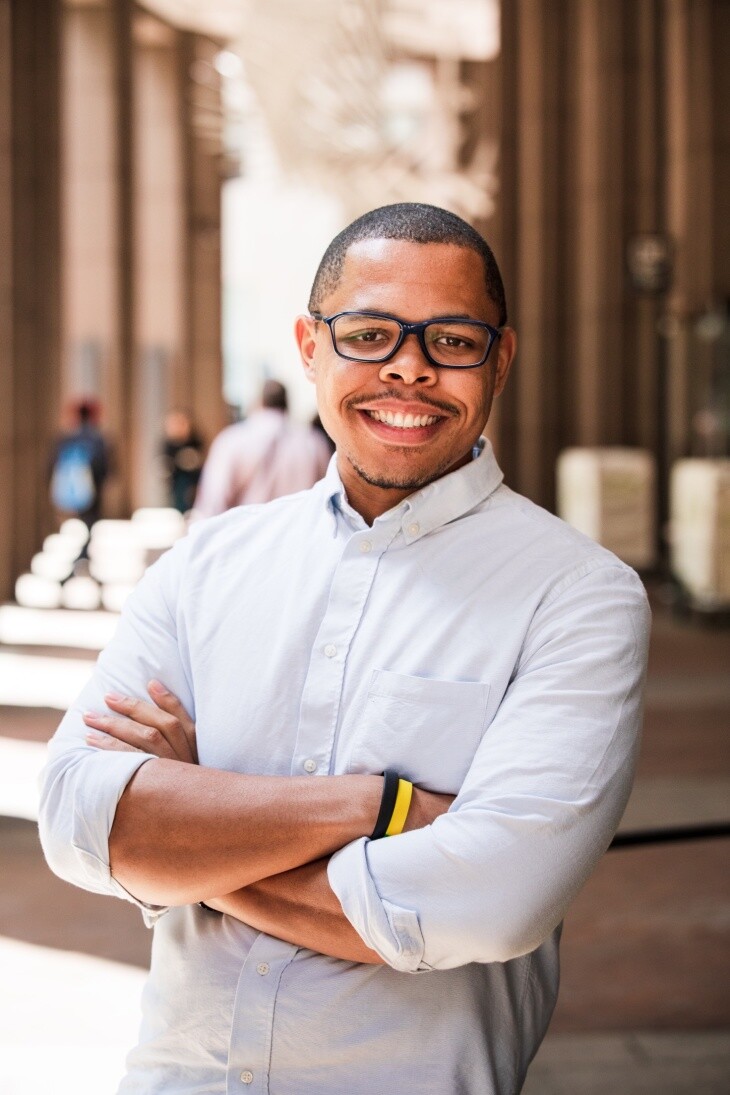
I told her, "My name is Eric Craig. I'm writing about your home." She opened her eyes so wide, they nearly popped right out of her head. "Oh," she flustered. "You're Eric Craig." She shrouded her palpable confusion with a cold, far-reaching smile. She unlocked her gate and invited me onto her property. I toured the house along with some of her friends that she invited. I didn't know much about them, but I knew they were rich and white.
Eventually we took a break and had hors d'oeuvres (I've never been one to turn down free open house cheese or any kind of snack for that matter). I stood on dark hardwood floors and sat uncomfortably in a high stool next to the kitchen island. I had a soft smile on my face, not out of contentment but discomfort.
The seller's white friends tried to start a conversation with me, but it felt like they were prodding me like livestock.
"You're a writer? That's very impressive. How did you get that job?"
"You've graduated college? Oh wow, that's amazing. Are you the first?"
"Did you play sports? Probably football, right?"
"You're very articulate."
I hate entertaining microaggressions. No, I'm not some sort of miracle case that learned to read by the fireside. I graduated summa cum laude. I never played, or even liked, sports. At that point in my life, I'd been writing professionally for three years. Both my mother and older sister are special education teachers with multiple degrees. We have talents, just like you, I wanted to say, and not by accident. What I've accomplished wasn't an impressive feat, it was me doing the best I can with my options at the time -- just like everyone else.
After the tour was over (and the cheese was gone), I left. I sat in my car for a second and then drove off.
MICROAGGRESSIONS IN LA
When I moved back to Los Angeles to advance my career, I chose to live in South L.A. My friends thought I was crazy. I've heard this region called everything from a zoo to a "living hell on earth." And it's true, there are many places that aren't kind and welcoming here. However, it's my home and where I grew up.
I won't say I make enough to buy a home anywhere in Los Angeles, because who can, right? But I could easily afford to rent in Echo Park, Silver Lake, or Downtown (if I decided to forego parking and avocado toast). Or even places like Pasadena, Manhattan Beach, or in West L.A.. But I don't feel comfortable in any of those places for long periods of time.
Don't get me wrong, I frequently travel outside my neighborhood: Before COVID-19, you'd catch me hanging out in the beach cities on the Westside, running errands in the South Bay, or exploring the city via Metro Rail. Though, in many of those places, I could feel the judgement of workers, customers, and residents. It's not everyone, but I experience it with many people.
In one particular moment, I was visiting a friend in a Silver Lake rehabilitation center. I left and decided to pick up groceries on my way home. I stopped at a chain store in the neighborhood. When I walked in, I remember several white people glaring at me through aisles as I rolled along with my basket. It didn't take me long to figure out I was the only black person in the store, and I didn't belong.
Even with the scars of 1992, I don't feel judged when I'm living my day-to-day life in South L.A. I don't feel excluded by my neighbors or workers in grocery stores and other storefronts. I don't have to code switch or internalize microaggressions. I don't have to experience W.E.B. Du Bois' double consciousness.
It's a shame, really. I have, in this country, a multitude of legislation that tells me that I'm free, equal, and worthy. But I don't feel that luxury everywhere. In the 503 square miles of Los Angeles, I only feel relaxed in my own neighborhood.
When I was that chubby kid during the summer, and my grandmother forced my arms behind my back, it was an extended metaphor for my life. I'll always have the looming reality of doing everything right, but never being above scrutiny.
ABOUT THE AUTHOR:
Born and raised in South Los Angeles, Eric Craig is a driven digital content creator for a nonprofit organization and a freelance multimedia journalist. He has contributed writing and video to Curbed New Orleans, Louisiana Weekly, Data News Weekly and a series of nonprofit organizations. A proud HBCU graduate, Eric received his bachelor's degree in political science from Xavier University of Louisiana in 2016. On Oct. 24, 2020, pandemic or not, Eric will marry Ms. Ariana Major, the love of his life.


